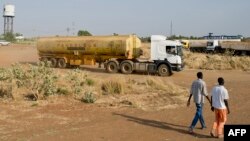Conflict continues to stifle South Sudan’s oil sector as asset holders reduce their investments and potential investors hold back due to instability.
The global research and consulting firm GlobalData reports oil production in South Sudan has significantly decreased since the end of 2013.
“Prior to the conflict the country was producing around 250,000 barrels per day and production since the conflict began, for the first half of 2015, has been around,160,000. It is mainly due to a shut-down of fields in Unity State, which occurred when the operator ONGC Videsh, part of Indian National Oil Company, pulled out at the beginning of 2014, shortly after the conflict began,” explained Matthew Jurecky, head of oil and gas research at GlobalData.
He further stated, “going forward, production is expected to continue to fall through the second half of 2015 as CNPC and Petronov - both operators in the region - have also withdrawn their foreign staff.”
The oil and gas researcher highlighted that South Sudan is a country where 90 percent of its national budget relies on oil revenues.
“So falling production doesn’t bode well for the government, especially with the conflict requiring funding to support the military and of course the people of South Sudan who are almost completely reliant on foreign aid,” said Jurecky.
In addition to instability in the country, the threat of potential sanctions based on the actions of the government and rebels are also causing potential investors to hold back.
“For example, Exxon-Mobile has already pulled out of an exploration agreement and Totale which had intended to conduct exploration has put that on hold. And the current operators who had existing relationships and operations in the country have pulled back from their investments,” said Jurecky.
Another consequence of the conflict in South Sudan has been the stalled plans between the Juba and Sudan to build new pipelines, a consequence that hurts both countries.
“It has a major effect as the agreement was set during a higher oil price environment as a flat fee. So since the oil price has fallen, South Sudan’s revenue on a per barrel basis has plummeted. It no longer is conducive to profitable operations for them. They’re also vulnerable to Sudan being their only export route and that of course could expose them further. But then again Sudan relies on those revenues just as much or almost as much as South Sudan relies on the oil production revenues,” said Jurecky.
While the country has the existing infrastructure in large reserves, Jurecky emphasized South Sudan does not have the local expertise to capitalize on its natural resources. He said until there is political stability in the country companies will continue to hold back their investments.




